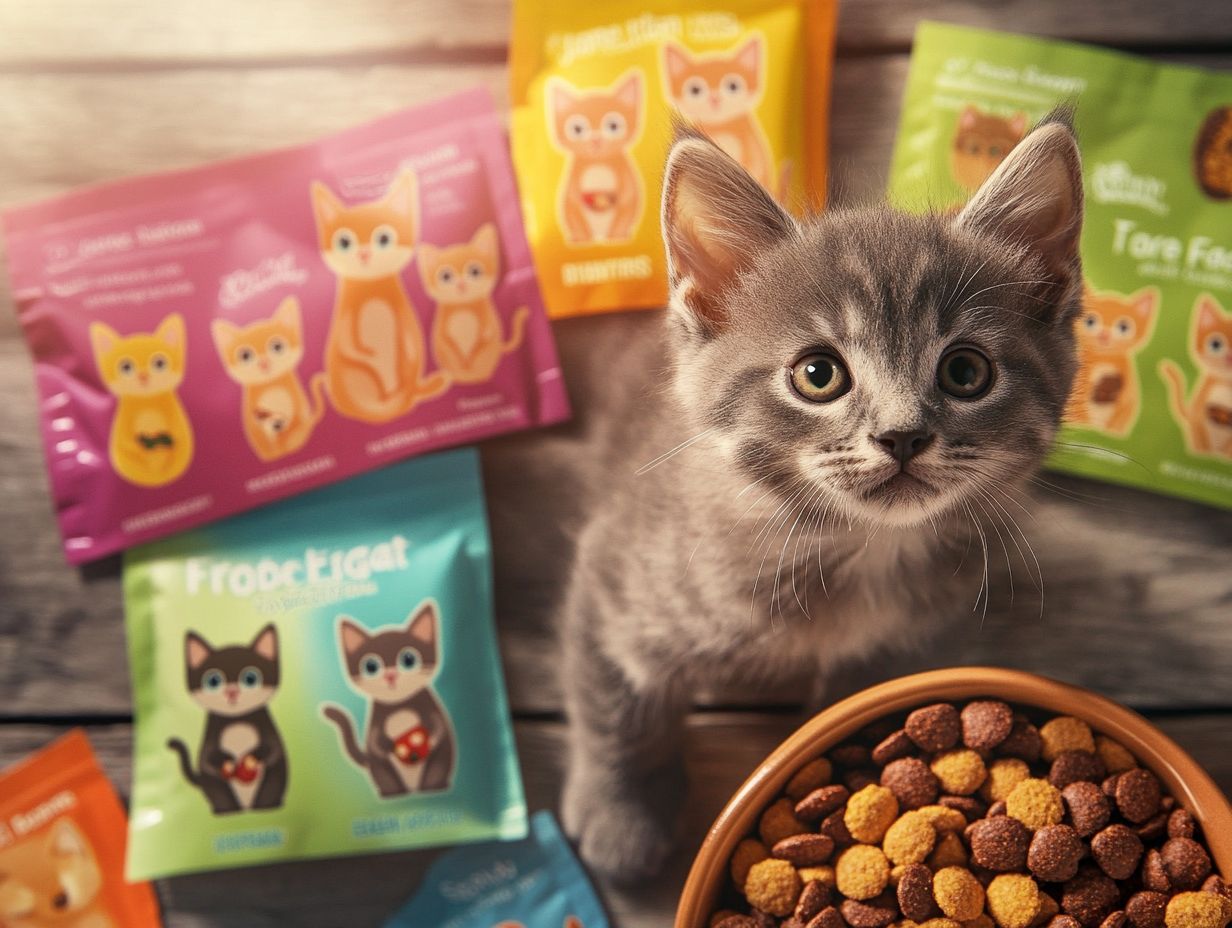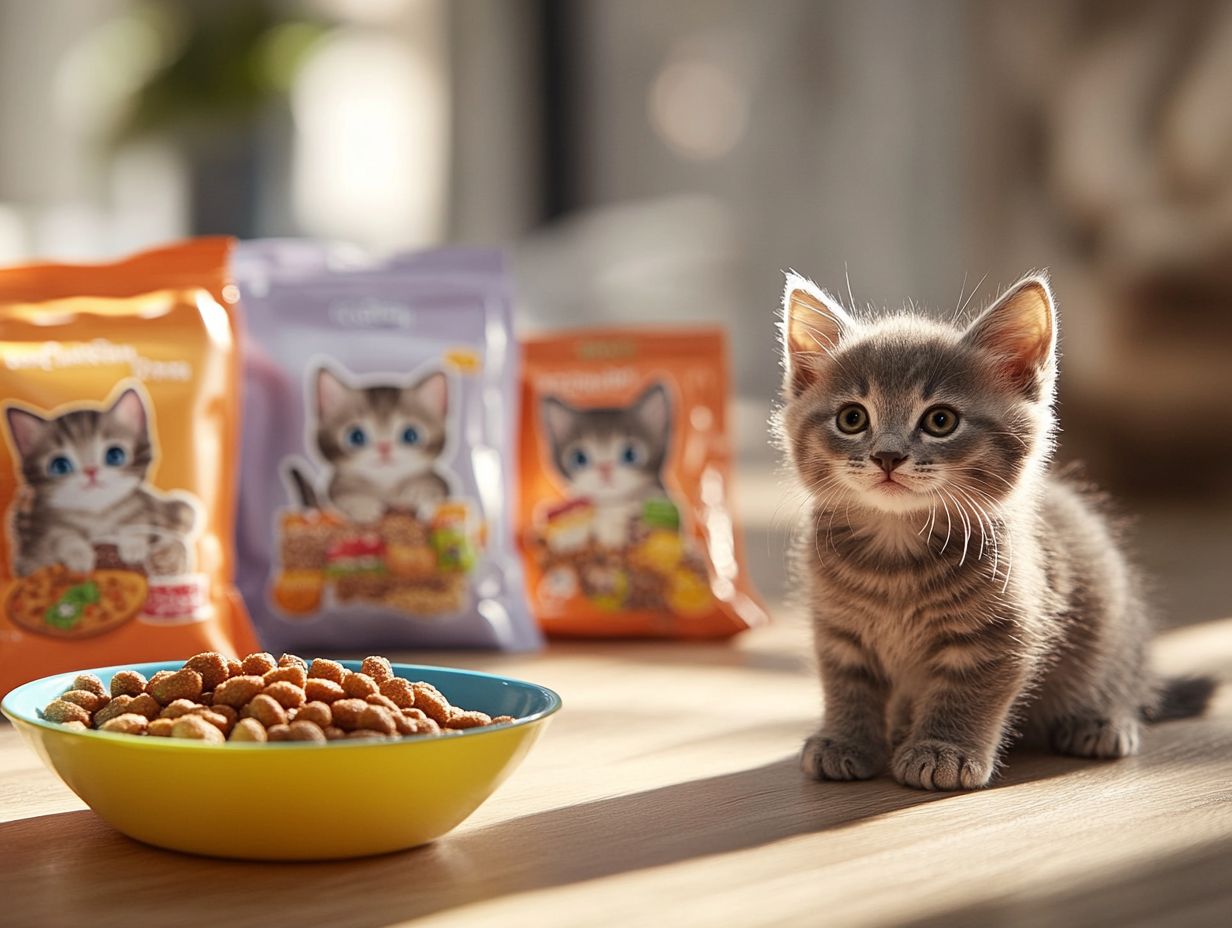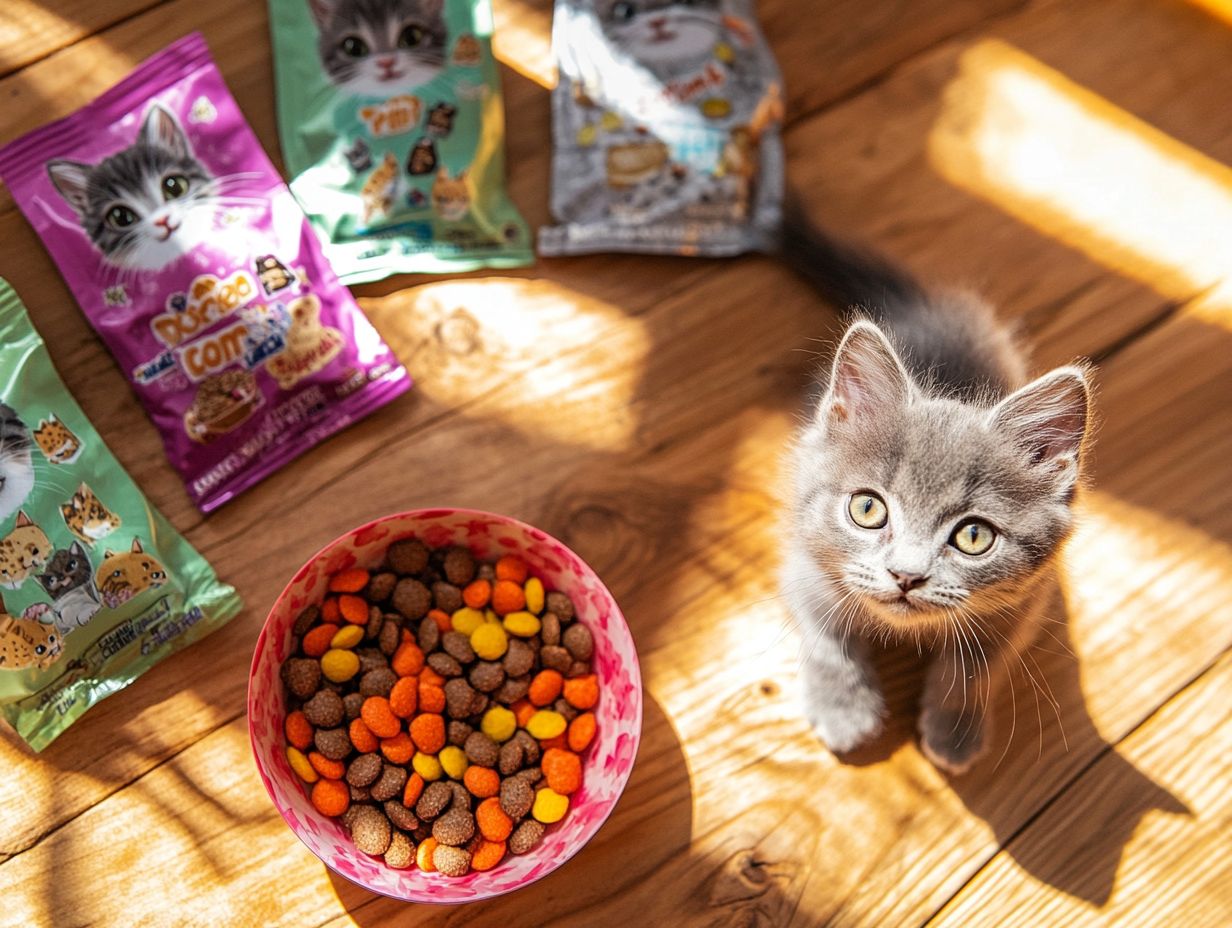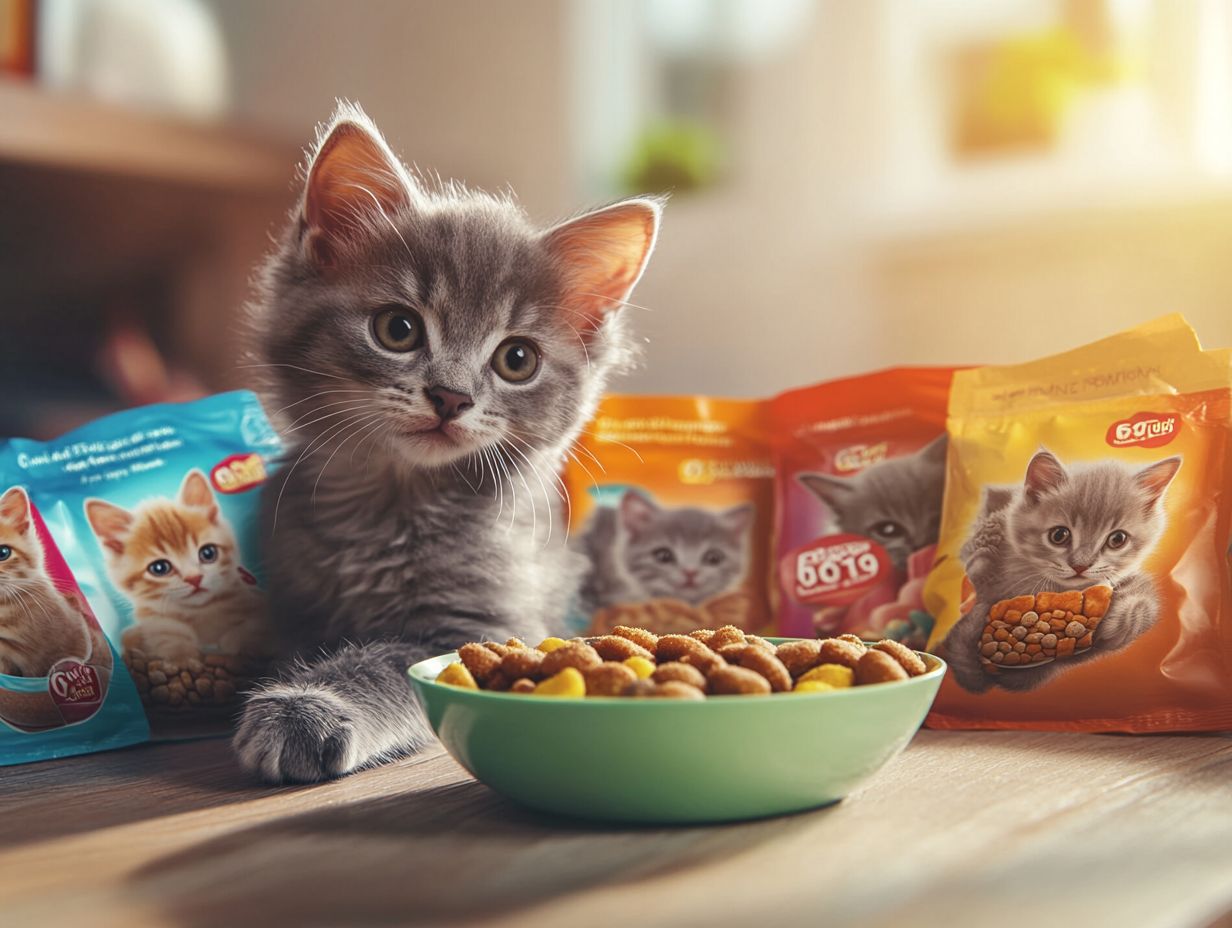Choosing the right kitten food is crucial for their growth and overall feline health. With so many options available, it can be overwhelming to determine what truly meets their nutritional requirements.
Discover the key factors to look for in kitten food, including kitten food types, ingredient quality, and adherence to AAFCO standards. Feeding guidelines and what to avoid will also be covered, ensuring your furry friend gets the best start in life.
Dive in to make informed choices for your growing kitten nutrition and feline health!
Key Takeaways:

What Should I Look for in Kitten Food?
Choosing the right kitten food is essential for ensuring proper feline health during the early growth stages of a kitten’s life. An ideal diet should include high-quality protein sources, primarily from animal origins, and essential nutrients that promote healthy growth and development.
Additionally, incorporating moisture-rich foods can aid hydration, providing hydration benefits and benefiting overall health. Consulting veterinary experts like Dr. Sarah Wooten, DVM, can significantly help in selecting a balanced diet tailored to individual kittens’ needs, especially for those with specific health issues such as kidney disease or diabetes.
1. High Protein Content
High protein content is essential in kitten food, as it supports rapid growth and muscle development, making it a vital component of a kitten’s diet. This crucial nutrient ensures that young felines can efficiently develop their body structure and energy reserves. It is important to ensure that the protein is primarily sourced from animals, as cats are obligate carnivores and require certain amino acids that are best obtained from animal proteins.
High-quality protein sources, particularly those from animal origins, provide amino acids that are vital for optimal health. These proteins play a significant role in forming muscle fibers, which is especially important during a kitten’s developmental phase. Additionally, incorporating taurine-rich foods into their diet is important, as taurine is an essential amino acid unique to felines that directly influences heart health, vision, and immune function. Deficiency in taurine can lead to serious health problems, including cardiomyopathy and retinal degeneration.
Proper nutrition, including sufficient protein and taurine, significantly contributes to a kitten’s overall well-being, helping them grow into strong and active adult cats.
2. Adequate Fat Content
Adequate fat content, particularly omega-3 fatty acids, is essential for maintaining energy levels and ensuring a balanced diet in kittens. Fats serve as a concentrated source of energy, making healthy fats a crucial component of a young kitten’s diet.
These beneficial fats provide the necessary energy for play and growth, and are vital for the development of a kitten’s nervous system. Omega-3 fatty acids, found in fish oils and certain plant oils, offer cognitive benefits that enhance learning and memory.
Additionally, omega-3 fatty acids are important for skin health, contributing to a shiny and healthy coat, which is important for socialization as the kitten grows.
3. Essential Vitamins and Minerals
Essential vitamins and minerals are crucial in kitten food, as they significantly contribute to the overall growth and development of kittens. These nutrients are vital for meeting the unique nutritional needs of growing felines.
For instance, vitamin D facilitates calcium absorption, promoting strong bone health, while vitamin A supports healthy vision and immune function. Essential minerals such as zinc and copper play a key role in proper cellular function and immune responses, helping to build a robust defense against infections.
Pet owners should be mindful of these important components when considering any dietary changes, as deficiencies can lead to lasting health issues. A well-balanced diet rich in these essential vitamins and minerals is essential for raising happy, healthy kittens.
4. DHA for Brain and Eye Development
DHA, a type of omega-3 fatty acid, plays a crucial role in the proper brain and eye development of kittens during their growth stages. It enhances cognitive function, leading to improved learning and memory abilities.
Feeding Guidelines
When feeding your kitten, it’s important to follow specific guidelines to ensure they receive the correct portion sizes and nutrients. Measure food portions according to the recommendations on the package based on your kitten’s weight and age. Regularly monitor their weight and condition to adjust feeding amounts as necessary.
Food Storage and Handling
Proper food storage and handling practices are vital for maintaining the safety and quality of your kitten’s diet. Always check expiration dates and store dry food in airtight containers to prevent spoilage. Look for signs of spoilage, such as off-smells or changes in texture, and avoid feeding any food that appears compromised.
Consulting with Your Veterinarian
Before making any changes to your kitten’s diet, especially for those with special dietary needs or health issues, it is crucial to consult with a veterinarian for personalized dietary advice. This ensures your kitten receives the best nutrition suited to their individual health requirements.
Additionally, DHA contributes to visual acuity, enabling kittens to navigate their environment and respond appropriately to stimuli. The significance of DHA in a kitten’s diet underscores the overall importance of omega-3 fatty acids. By ensuring that their meals are rich in omega-3 fatty acids, caretakers can foster healthy development and establish a strong foundation for a healthy and active life.
5. Probiotics for Digestive Health

Probiotics are beneficial microorganisms that significantly enhance digestive health, ensuring optimal nutrient absorption vital for a growing kitten. These microorganisms help develop balanced gut flora, which is essential for improved digestion and the prevention of gastrointestinal issues, aligning with current veterinary guidelines.
Including soft, wet food in a kitten’s diet aids digestion, as it is easier to chew and swallow. It is crucial to ensure that the wet food is nutritionally balanced for kittens, as not all wet food is suitable. Furthermore, this type of food has a higher moisture content, contributing to proper hydration.
By incorporating probiotics and easy-to-digest soft foods into a balanced diet, we promote better digestion and ensure adequate nutrient intake for their developing bodies.
What Are the Best Types of Kitten Food?
Kitten food can be categorized by its form, which includes three main types:
- Dry cat food
- Wet kitten food
- Semi-moist food
Each type offers its own advantages and disadvantages, depending on the nutritional needs of the kitten and the preferences of the owner. It is recommended that pet owners consult with their veterinarian before choosing a food type, especially for kittens with special dietary needs.
1. Dry Kitten Food
Dry kitten food is a popular type of pet food that is generally well-rated for its quality ingredients and its ability to promote dental health. The crunchy texture of dry food helps minimize plaque buildup and supports healthier gums. It is important to select products that meet AAFCO standards, ensuring the food is nutritionally adequate for kittens.
A well-formulated dry diet can provide all the essential nutrients necessary for a kitten’s growth and development. Recipes that are calorie-dense, containing a high number of calories per serving, often include high-protein ingredients such as chicken or fish, as well as healthy fats to supply energy.
Feeding recommendations typically suggest offering between ¼ to 1 cup of dry food per day, depending on the kitten’s weight and age. Consider trying a well-respected brand for a complete nutrition option.
2. Wet Kitten Food
Wet kitten food, such as Fancy Feast Kitten Tender Turkey Feast Canned Cat Food, provides excellent hydration support and is often preferred by many kittens. Its easy-to-chew texture facilitates the weaning process from milk to more solid foods.
High in moisture, this type of food contributes significantly to hydration, which is crucial for the overall health and vitality of a kitten. Many brands of soft wet food contain essential nutrients tailored to meet the specific needs of kittens, ensuring they receive the necessary protein and fats for proper growth. However, due to the palatability of wet food, there is potential for overfeeding, so it is important to follow feeding guidelines based on the kitten’s weight.
Additionally, wet food can entice picky eaters and stimulate their appetites.
3. Semi-Moist Kitten Food
Semi-moist kitten food is an excellent option for pet owners seeking convenience and a balance between dry and wet food alternatives. This type of food offers flavors and textures that kittens enjoy, while also being easy to prepare and serve, resulting in less mess than wet food.
Nutritionally, semi-moist kitten food is complete, offering a balanced diet that meets the specific dietary, vitamin, mineral, and protein requirements essential for healthy growth and development. However, some semi-moist foods may have higher sugar content, so it’s advisable to read ingredient labels to avoid excessive sugar.
Additionally, semi-moist options ensure that kittens receive a properly balanced diet during critical growth periods.
What are the Top Brands of Kitten Food?
The top kitten food brands, known for their high standards of quality and nutritional effectiveness, include:
- Wellness CORE
- Royal Canin
- Hill’s Science Diet
1. Royal Canin Kitten Formula
For best practices, always check that chosen brands comply with veterinary nutritional standards and have been verified against AAFCO guidelines.
Properly Storing Kitten Food
To maintain the safety and nutritional integrity of opened kitten food, store it in a cool, dry place and seal it properly to prevent spoilage. Pay attention to the expiration dates and adhere to handling practices to ensure the food remains safe for your kitten.
Ethical Considerations
Consider the ethical implications and environmental impact of various diet types for kittens. While the focus remains on the cat’s health, it’s also important to be aware of how our choices affect the broader environment.

Royal Canin kitten food is a specially formulated veterinary diet designed to meet the unique nutritional needs essential for the optimal growth and development of kittens. This formulation offers a rich supply of high-quality protein to promote strong muscles and maintain organ health.
It includes balanced ingredients such as vitamins, minerals, and antioxidants that support overall health and well-being. The product closely aligns with typical veterinary recommendations, demonstrating its ability to cater to the specific requirements of young cats, helping them to live long, healthy, and active lives.
With a focus on both palatability and digestibility, this food ensures optimal growth and development while appealing to the preferences of growing cats. Always consult with a veterinarian before making dietary changes, especially if your kitten has specific health needs or conditions.
2. Hill’s Science Diet Kitten Food
Hill’s Science Diet is a nutritionally balanced option that offers kitten food specifically designed to provide the essential nutrients necessary for proper growth and development. This specialized diet addresses various dietary sensitivities, ensuring that even the pickiest eaters receive the nutrition they need.
The recipes feature high-quality protein along with optimal levels of vitamins and minerals to support the healthy development of young cats. Pet owners frequently review Hill’s Science Diet, noting the brand’s scientifically focused nutrition, backed by AAFCO guidelines, with many reporting improvements in their kittens’ energy levels and overall health.
Reviews often highlight how easily young cats adapt to this food with minimal digestive upset. The variety of flavors keeps finicky eaters engaged, making Hill’s Science Diet a scientifically supported choice among discerning pet owners.
3. Purina Pro Plan Kitten Food
Purina Pro Plan offers a protein-rich kitten food formula that prioritizes essential nutrients necessary for strong growth and development. This formulation is specifically designed to provide a balanced mix of proteins, fats, and vitamins required for growing cats.
The feeding guidelines not only meet but often exceed AAFCO minimum standards, ensuring that young cats receive the essential components they need for optimal health. Purina Pro Plan’s kitten food includes real meat as the first ingredient, delivering both taste and nutrition.
Additionally, grain-free options are available for those with sensitivities, but it’s important to consult with a veterinarian about the risks of potential nutritional deficiencies when feeding grain-free diets to growing kittens.
4. Blue Buffalo Wilderness Kitten Food
Blue Buffalo Wilderness is a grain-free kitten food designed to promote health and vitality through natural ingredients. This premium formula is carefully crafted to provide high-quality proteins, healthy fats, and essential nutrients tailored to the unique developmental needs of young cats.
By removing grains, the food reduces the likelihood of food sensitivities and allergies, ensuring that your kitten receives all the necessary nutrition without unnecessary fillers. The nutrient-dense formula supports proper muscle development, healthy growth, and energetic activity levels.
A grain-free diet can enhance digestive health, but it’s crucial to ensure it is balanced to avoid deficiencies, especially in kittens.
5. Wellness Complete Health Kitten Food
Yes, Wellness Complete Health is a reputable brand of kitten food. This brand takes a science-based approach to pet care, providing balanced nutrition specifically tailored to meet a kitten’s unique needs.
Wellness Complete Health uses high-quality proteins along with a variety of vitamins and minerals that work together to promote healthy growth and development in young cats. The carefully balanced ingredients help build their immune systems and support digestive health while ensuring the food is both tasty and nutritious. For more information on the best options for your kitten, check out Best Cat Food for Kittens: Essential Nutrition for Growing Felines.
Additionally, this brand offers multiple options to accommodate a range of dietary needs and preferences. By thoughtfully integrating various ingredients, Wellness Complete Health effectively addresses dietary sensitivities, making it an excellent choice for households with special feline requirements.
How Much and How Often Should I Feed My Kitten?
Determining the appropriate amount and frequency of feeding your kitten is essential for meeting their nutritional needs and supporting healthy growth and development. Refer to AAFCO feeding guidelines for kittens, which typically suggest portions based on weight and age.
Monitor your kitten’s weight and body condition regularly to prevent obesity, adjusting food amounts as they grow. Proper food storage practices are also crucial; store dry food in a cool, dry place and recognize signs of spoilage, especially with raw or homemade diets.
While most commercial kitten foods are balanced, if considering supplements, always consult your veterinarian. Over-supplementation can lead to toxicity and other health issues.
What Should I Avoid Feeding My Kitten?

These foods should be avoided, as they can negatively impact a kitten’s health and lead to dietary sensitivities. Ingredients such as fillers can lead to obesity, while by-products may potentially cause allergies.
Frequently Asked Questions
What is the best cat food for kittens?
The best cat food for kittens is one that meets the specific nutritional needs of growing felines. Look for formulas labeled specifically for kittens, as these will typically contain at least 30% protein and 9% fat to support their growth and development, according to AAFCO guidelines.
What are the essential nutrients for growing kittens?
The essential nutrients for growing kittens include high-quality protein, fat, vitamins, and minerals. These are necessary for their muscles, bones, and organs to develop properly, as well as for their immune systems to stay strong. Be cautious of commercial kitten foods that may lack critical nutrients during this growth phase.
Should I choose wet or dry cat food for my kitten?
It is recommended to feed your kitten a combination of wet and dry cat food. Wet food provides hydration and can be more appealing to picky eaters, while dry food helps maintain healthy teeth and gums. Ensure your kitten has access to fresh water daily, aiming for about 2.5-4 ounces of water per 5 pounds of body weight. Consult with your veterinarian to determine the best ratio for your kitten.
Are there any ingredients I should avoid in kitten food?
Avoid kitten food with fillers, by-products, and artificial preservatives, colors, and flavors. These offer little nutritional value and can be harmful to your kitten’s health. Look for natural and whole ingredients in their food. Always consult with your veterinarian regarding dietary needs, especially if your kitten has special health conditions.
How often should I feed my kitten?
Kittens need to be fed more frequently than adult cats. It is recommended to feed them three times a day until they are six months old, then gradually decrease to twice a day. Ensure portion sizes are appropriate based on your kitten’s weight and growth rates to prevent obesity. Consult with your veterinarian for a personalized feeding schedule based on your kitten’s needs.
Can I switch my kitten’s food as they grow older?
It is important to transition your kitten to adult cat food once they reach one year of age. This will ensure they continue to receive the necessary nutrients for their development. Gradually mix the new food with their current food to avoid digestive upset. Be aware that some nutrients present in kitten food, such as certain vitamins and minerals critical for growth, may be lacking in adult formulas.
What are some food storage tips?
Proper food storage and handling practices are vital to prevent spoilage. For wet food, refrigerate any leftovers and use them within a few days, ensuring that the can is sealed properly. Dry food should be kept in a cool, dry place in an airtight container to maintain freshness.
Are there ethical considerations when choosing cat food?
While ethical and sustainability concerns are valid, the primary focus should remain on the nutritional adequacy of the diet for the kitten’s health, as they are obligate carnivores with specific dietary requirements.